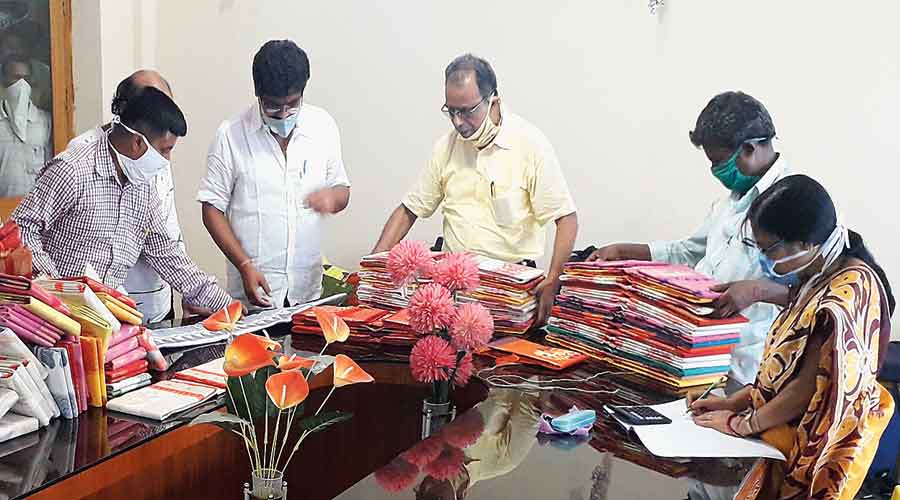The Bengal government, in a rare move, is going out of its way to buy handloom saris from around 10,000 small and marginal weavers to try and buffer the financial blow of the pandemic-induced lockdown.
The state government has tasked the West Bengal State Handloom Weavers’ Co-operative Society Limited, which runs Tantuja, to hold camps and directly buy saris from marginal weavers in East Burdwan and Nadia districts.
Tantuja has 82 selling points across the country of which 70 are in Bengal, said an official. Handloom saris sourced directly from weavers — their money is being transferred to their bank accounts — will be sold at these outlets.
The model is similar to the one that the government employs to buy produce directly from farmers against a minimum support price.
Till last week, Tantuja held at least half a dozen such camps in the two districts. At a camp held in Nadia’s Phulia last week, Tantuja bought 3,108 handloom saris directly from weavers for Rs 25.67 lakh.
Bengal’s handloom weavers have been hard hit as markets remained closed and sales plummeted since the Covid lockdown. Sources in the textiles department said that around 6 lakh weavers and craftspersons associated with the handloom sari industry across Bengal were reeling under the crisis amid the pandemic, but of them, some 10,000 small and marginal weavers are the worst hit.
Tantuja’s officer on special duty (marketing) Subhabrata Bandopadhyay said: “Handloom weavers are in deep trouble. So our aim is to procure the maximum number of saris from them. We will sell their products through our stores.”
Asked about the price offered to weavers, a Tantuja official said: “Prices vary depending on the product, but we are offering standard wholesale market price. The base material that we procure starts at Rs 250. A jamdani can fetch a weaver at least Rs 5,000.”
State micro and small scale enterprise and textiles minister Swapan Debnath said: “Many weavers across the state could not sell their products because of the lockdown restrictions. It is our small effort to help weavers and recognise their craftsmanship since they have been suffering financially because of the pandemic.”
Though he did not specify how many camps would be held before Durga Puja, the minister added that the effort would go on and the aim was to cover every weaver in distress. He did not specify if the department had fixed a budget for the procurement drive.
Tantuja usually buys handloom saris through Primary Weavers’ Cooperative.
The ongoing procurement is in addition to the regular procurement.
“This is only because we want to help the small and marginal weavers in their times of financial crisis,” Debnath added.
Weavers are happy as the camps are being held before Durga Puja.
Ananda Basak, a weaver in Phulia, said: “A huge number of saris remains stockpiled at home. The retailers are showing no interest to buy our products ahead of the festive season due to lack of cash flow in the market. They want saris on credit, but we are facing a cash crunch. This is the time when we rake in funds and use the money to purchase raw materials. Moreover, traders from other states buy saris. But Covid has robbed us of that opportunity. In such a difficult situation, the procurement initiative by the government has come as a ray of hope.”
Debnath’s deputy Ratna Ghosh, who was present at the Phulia sari procurement camp last week, said: “Our aim is to procure saris in maximum numbers and not leave any small weaver unhappy. However, there will be no compromise on quality.”
Debnath added he had submitted a similar proposal to the state government to procure powerloom-made saris. “That would require an amendment to clauses that govern Tantuja because it allows procurement of handloom saris and nothing else.”











